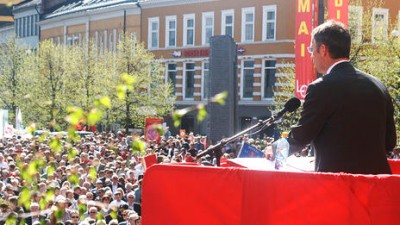This year’s wave of strikes, the worst of which finally ended over the weekend, has unleashed a rash of criticism from all sides. Prime Minister Jens Stoltenberg broke away from leading a Nordic council over prime ministers on Sunday to let it be known that he’s among the biggest critics of them all.

Stoltenberg told Norwegian media he’ll be calling in both labour and business leaders to see what went wrong in this year’s stream of failed labour negotiations, and what can be done to fix Norway’s complicated negotiating process.
“There’s been a lot of strikes and questions have been raised as to whether they could have been avoided,” Stoltenberg told newspaper Dagsavisen. “It would be stupid not to look at our routines, and see how things are done.”
State and municipal workers finally went back to work late last week after striking for more than two weeks. On Friday night, Stoltenberg’s labour minister, Hanne Bjurstrøm, felt compelled to step in and forcibly end a separate, ongoing strike by security guards around the country. Their strike had clogged Norwegian airports, disrupted cash supplies, emptied minibanks and created security concerns at a wide range of public gathering places.

It was the situation at airport security control checkpoints, however, that prompted Bjurstrøm to impose what’s called tvungen lønnsnemnd (compulsory arbitration) and order the strikers back to work. Issuing such an order “is always very serious,” said Bjurstrøm, who’s from the Labour Party herself and not inclined to interfere in strikes. “This has been a legal strike and I waited a long time and didn’t want to step in.”
She said it was “the total situation,” with service at as many as 14 airports disrupted and several forced to close, that prompted her to act, clearly with Stoltenberg’s support. With no sign of a settlement in sight, Bjurstrøm said the left-center government believed it was “irresponsible” to let the strike drag on. Neither side was happy as they headed into arbitration to settle their differences.
Additional strike action that would have affected airline travel in Norway, by airline mechanics and workers at airport authority Avinor, was averted early Saturday even though airlines experienced delays because of a reported lack of air traffic controllers during the weekend.
Most everyone involved in this year’s strikes has blamed others for the longest and most disruptive strikes Norway has experienced in 28 years. Most agree it was especially ironic that the labour unrest occurred after seven years of a Labour Party-led, left-center government. Employers, including those in the public sector and not least the state government, claimed the labour organizations had expectations that were far too high, regarding pay raises and working conditions. The employees claimed they weren’t being heard, and that many of their pay issues had festered for years without being addressed.
Stoltenberg, clearly shaken that such strikes could occur during his administration, now seems keen on pushing through changes in how the negotiation process runs in Norway. Big pay raises in some industries, often oil-related where demand for specially trained workers is high, shouldn’t set the standard for other wage negotiations. The current system has allowed that in some ways, while average wage growth has hovered around 4 percent, at a time when inflation is only around 1 percent.
“No other country in Europe even comes close to that level of improvement in purchasing power,” stresses Stoltenberg. “Both public and private sector workers have enjoyed strong growth in purchasing power for several years.”
He denies that his call for a review of the labour negotiating process is a sign of political meddling. “No, to the contrary, I want free negotiations,” he said, “but everyone, both employers and employees, wants to succeed without conflicts.”
Union leaders generally seemed to welcome Stoltenberg’s initiative to clear the air after weeks of conflict, and didn’t see themselves as being scolded or “called on the carpet” by the prime minister. “This is positive,” Arne Johannessen, the chief negotiatior for labour organization Unio, told Norwegian Broadcasting (NRK). “And apparently absolutely necessary.”
Views and News from Norway/Nina Berglund
Please support our news service. Readers in Norway can use our donor account. Our international readers can click on our “Donate” button:

